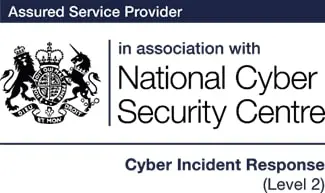You have trained your team to be helpful and courteous, but have you educated them to differentiate between genuine customers and cyber criminals posing as customers?
Social Engineering awareness will ensure that people are not the weak link in your cyber plan.
Cyber criminals are increasingly turning to social engineering because it is an effective and subtle way to gain access to employee login credentials, personal information and quantities of sensitive data.
Benefits of training for social engineering attacks

Expose
Our targeted phishing campaigns simulate real-world hacking and social engineering techniques to expose vulnerabilities in your security.
Educate
Our social engineering experts will provide the training your employees need to spot suspicious communications and malicious links.

Protect
Our industry-leading experts can provide your workforce with the knowledge and tools to keep hackers at bay and to protect personal data.
Discuss your cyber security options
Get in touch today to speak to an expert and secure your business, or call us on 0800 090 3734
The top emotional motivators behind successful phishing attacks are entertainment, social, and reward or recognition.

Social engineering training
We'll find your operational weaknesses
Cyber criminals know that people are often the gateway to sensitive information, valuable credentials and databases or account details. A compromise in security could open up the possibility of identity theft.
- Cyber-attacks can start with phone calls, private messages or email
- Cyber criminals may impersonate other members of staff
- Communications can be compromised
- Criminals often play on the friendly and helpful nature of your employees
- We’ll train your staff to spot malicious communications
- We’ll expose weaknesses in your infrastructure and stop attacks before they happen
Get smart – don’t let a lack of awareness compromise your confidential data.
Lack of staff training & awareness always results in weak security


33%
of hacks involve social engineering
43%
of breaches targeted SMEs
91%
of attacks begin with an email
Even with the most sophisticated security systems in place, your business could still be vulnerable to cyber attack. By manipulating members of your workforce into disclosing passwords and other confidential information, hackers are able to infiltrate your systems and harvest valuable data.
A security breach such as this could cause financial and reputational damage to your organisation.
Enquire about social engineering trainingExplore our related services
Discuss your cyber security options
Get in touch today to speak to an expert and secure your business, or call us on 0800 090 3734
We're on the front line, making robust cyber security attainable for all businesses.
You're safe with us.
We understand that no two companies are the same, and our dedicated team will work closely with you to identify the risks and vulnerabilities unique to your business.
We’ll provide intelligent, tailored solutions, and make sure you get the best cyber security package possible.
Protect your business
A security partner you can trust
As with all cyber security, social engineering training should form a key part of any security package. We’ll work with you to identify and remedy weaknesses in your security before a malicious party exploits them.
Frequently Asked Questions
Here’s something to think about
Since 2017 there has been a 14% (from 72% to 86%) rise in businesses experiencing phishing attacks. And that’s just in those organisations who report them!
In 2019, it was reported that 23.2 million hacking victims had “123456” set as their password. Something as simple as educating your workforce in how to set and update strong passwords could make a real difference.
Get in touchSocial engineering is a modern form of hacking, where the malicious actor will try to gain access to computer networks or data stores by gaining the confidence of authorised members of your team.
Phishing
Email spam purporting to be from a trusted source, asking for credentials or other authorised action.
Baiting
Leaving infected USB pens or CD’s onsite to trigger curiosity of staff by inserting into an authorised network machine.
Quid Pro Quo
They’ll make a deal with a member of staff to get what they want in return for a financial incentive or high value gift.
Tailgating
The act of physically following a team member into a secure area of your building under the pretext of them being authorised themselves.
Spear phishing is a highly targeted approach focusing on a single member of your business. They’ll sue personal information specific to the recipient in order to gain trust and appear more legitimate.
This can often be information they’ve found online via, Twitter, LinkedIn or even your own company website!
Spear phishing has a high rate of success for tricking staff into divulging sensitive information.
Cyber Security Experts
Our team comprises professionals selected for their industry expertise and outstanding work ethic, allowing us to provide you with market leading cyber security services.
Long term solutions
We deliver long term solutions to ensure your company is protected. A longstanding partnership with the right cyber security provider is invaluable.
Personal touch
Your business is unique. We will listen and work closely with you to understand your challenges, identify the vulnerabilities that are particular to your business, and put in place tailored countermeasures.
Industry leaders
Our expertise, experience and knowledge base puts us in the ideal position to deliver industry leading protection against existing and emerging cyber threats.
Managed Service
No single test or report is ever going to be enough to secure an organisation against the complex cyber threat landscape. As your Managed Security Service Provider (MSSP) we will construct a developed, bespoke and reactive plan to take care of your entire cyber security requirements now and into the future.
- Your trusted partners, we’ll deliver guidance, support and recommendations based on real evidence and genuine assessment of your business needs.
- We’ll continually test your networks, identify exploitable factors, and upgrade your facilities to meet your evolving needs.
- We’ll make sure your cyber protection remains robust, comprehensive and cutting-edge.
Find out more about our managed service:
Managed cyber security packagesDiscover our knowledgebase
Protect Your Business & Your Reputation.
With a continued focus on security, you can rest assured that breaches and exploits won't be holding you back.


























